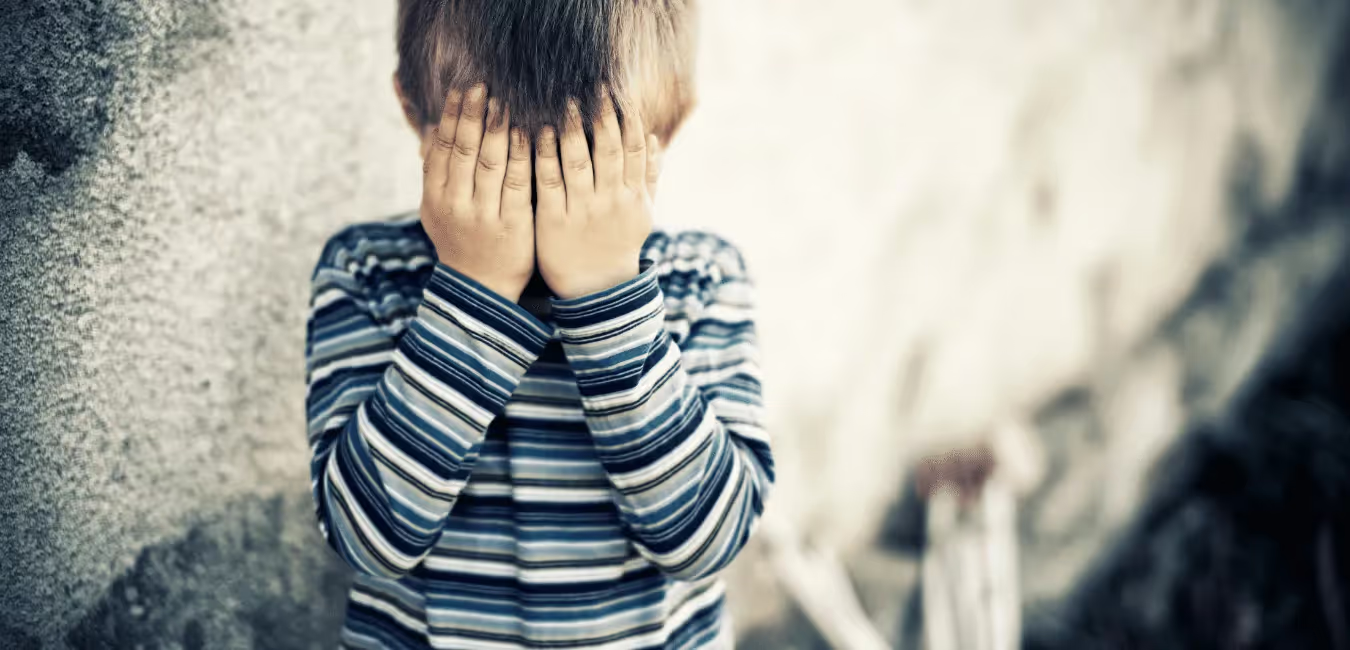The Long-Term Effects of Childhood Trauma


Children aren’t immune from experiencing traumatic happenings. Whether it’s parental divorce, grieving the loss of a pet or loved one, witnessing a violent crime, or being the victim of abuse or neglect, childhood trauma comes in many different forms and levels of severity.
Some readjust after the traumatic event and move on. But for others, the long-term effects of childhood trauma can span far into adulthood. If left unresolved, trauma can impact various aspects of your life, leading to mental and physical health problems and even intimacy disorders that mandate treatment, such as sex and pornography addictions.
Understanding Childhood Trauma
Childhood trauma can happen when a young person experiences a distressing, dangerous, or violent event before the age of 18. These upsetting events are known as Adverse Childhood Experiences (ACEs). They fall under the main categories of abuse, neglect, and household dysfunction.
The 10 main ACEs are:
- Physical abuse
- Sexual abuse
- Emotional abuse
- Physical neglect
- Emotional neglect
- Living with a relative with a mental illness
- Having an incarcerated parent
- Witnessing domestic abuse in the home
- Alcohol/substance use in the home
- Parental divorce
While only these 10 ACEs are officially recognized, many experts believe this list should be expanded. Some experiences may not fall into the above categories but can still cause emotional trauma in childhood.
One-off traumatic events such as natural disasters, terrorism, community violence, or serious illness or injury can have long-term psychological effects on children. Ongoing stress from bullying, racism, food uncertainty, or living in foster care may also lead to trauma.
Experiencing trauma as a child can result in neurobiological changes in the brain during its most critical developmental stage. These changes often affect the regions of the brain responsible for processing emotions, impulse control, and regulating stress responses.
Untreated, this emotional and psychological dysregulation can have detrimental effects on you later in life, resulting in symptoms of childhood trauma in adulthood. The long-term effects of childhood trauma range from mental and physical health issues to relationship and intimacy problems and addictive or compulsive behaviors.
Factors That Impact the Long-Term Effects of Childhood Trauma
Everyone experiences and processes trauma differently. Just because a child experiences an upsetting event doesn’t necessarily mean they will experience emotional trauma as a result. For example, parental divorce is upsetting for most children, but only a small percentage will experience long-term trauma as a result.
So why are some people more affected by trauma than others? Numerous factors can determine how traumatic an event is for you and how well you cope with it.
Factors that impact the effects of childhood trauma:
- Severity. The nature and intensity of the event can influence its impact on you. Were you seriously hurt? Was your life in danger? Did it have a significant impact on your everyday life? The more severe and impactful the event, the higher the chance of it resulting in long-lasting trauma.
- Proximity. Did the traumatic event happen directly to you? Did you witness it happen to someone else? Or is it something you learned about? The proximity of the event to you can also impact the resulting trauma.
- Age. Research has found that the exact age at which you experience a traumatic event may influence its impact. Experiencing trauma during a developmental “sensitive period” may increase the severity of its effects.
- Previous Trauma. Some children experience multiple traumatic events early in life. These negative experiences can build on one another and amplify the effect that each has on you.
- Reaction. How did those close to you, such as your caregivers, react to your trauma? Were they empathetic and supportive? Or were you left to deal with it alone? Children with understanding and loving caregivers tend to be better prepared to cope with trauma.
- Social Support. It’s not only your caregivers and immediate family that influence how you respond to negative experiences. The support you receive from your wider community is also vital and can help reduce the long-term risks of childhood trauma.
Long-Term Effects on Mental Health
The most significant long-term impacts of childhood trauma are the emotional and psychological effects it can have later in life. Those who experience trauma at a young age have a higher risk of developing serious mental health conditions as adults.
Post-traumatic stress disorder (PTSD) is the most severe disorder related to childhood trauma. It’s estimated that up to 15% of girls and 6% of boys develop PTSD following a traumatic event.
PTSD can present itself as recurring flashbacks or nightmares, memory loss, hypervigilance, negative thinking, and strong reactions to trauma-related triggers. These symptoms can occur immediately after the event or much later in life.
The brain changes and ongoing stress placed on the nervous system due to trauma can also make you more prone to mental health conditions such as depression, mood disorders, and anxiety disorders later in life.
Other psychological and emotional effects of trauma:
- Psychotic disorders
- Suicidal ideation
- Emotional dysregulation
- Low self-esteem
- Poor stress management
- Guilt, shame, and self-blame
Long-Term Effects on Physical Health
It’s not only your mental health that trauma affects. Extreme stress at a young age impedes the development of the immune and central nervous systems, impacting your physical health too.
Studies have found that those exposed to trauma as a child have an increased risk of developing several chronic health conditions later in life, including heart disease and cancer. Lower immunity caused by stress can also increase your risk of infections and illnesses.
Health risks related to childhood trauma:
- Diabetes
- Asthma
- Obesity
- Heart disease
- Autoimmune disease
- Stroke
- Cancer
- Chronic pain
- Sleep disorders
Long-Term Environmental Risks
The impact of childhood trauma extends well beyond mental and physical health issues. The deep-rooted damage caused by trauma can lead to problems in many different aspects of people’s adult lives, from the workplace to intimate relationships.
Childhood trauma can significantly impact your ability to form healthy attachments and stable relationships as adults. When trauma is instigated by a parent or caregiver, such as abuse or neglect, children develop trust issues and learn that they can’t rely on others. This can manifest as a fear of intimacy and attachment disorders showing up later in life.
A study found that people who experienced abuse in childhood were less likely to feel satisfied in relationships, even in the newlywed phase.
Other environmental effects of childhood trauma:
- Poor job or academic performance
- Relationship issues
- Lack of productivity and motivation
- Alcohol or substance use
- Greater likelihood of incarceration
The Relationship Between Childhood Trauma and Sex Addiction
Childhood trauma can significantly impact your psychological and emotional well-being throughout your life. When this trauma goes unresolved, it may lead to the development of adverse coping mechanisms, including compulsive sexual behaviors.
Adverse coping mechanisms often involve seeking a source of dopamine, the brain’s pleasure chemical, in an attempt to manage or escape the overwhelming negative emotions stemming from trauma. Dopamine helps calm the “fight-or-flight” response your brain and body are stuck in due to your past experience.
Sex, masturbation, and pornography are some of the most accessible forms of dopamine. The dopamine rush of sexual release can make you feel better temporarily.
Once your brain makes the connection between sex and dopamine, a new neural pathway forms in your brain between stress, trauma, and sex. Sex becomes a way of self-medicating and coping with life’s daily stressors. In other words, your brain links sex and trauma, creating an addiction. But this temporary relief won’t help you overcome your trauma and its symptoms in the long run.
As your brain becomes adjusted to the dopamine, you may start engaging in riskier and more regular sexual behaviors to get the same rush. Eventually, these compulsive sexual behaviors become an addiction. And once this addiction starts to impact other aspects of your life, it’s time to seek sex addiction treatment.
Healing From the Long-Term Effects of Childhood Trauma
Childhood trauma can have far-reaching effects on all aspects of your life, even years after the event first happened. When left unresolved, trauma can manifest as an intimacy disorder, such as sex or porn addiction. But the good news is that it’s never too late to overcome childhood trauma and its effects.
To combat the long-term symptoms of childhood trauma, it’s crucial first to uncover and process the underlying cause. Healing the root cause leads to more effective and long-term recovery than simply focusing on the symptoms themselves. To do this, you should choose a therapist who specializes in trauma-informed therapy.
Certified sex addiction therapists (CSATs) are trained in trauma-informed therapy. They have highly specialized knowledge of the underlying trauma and emotional wounds related to sex addiction. Their trauma-informed approach involves shifting the approach from “what’s wrong with you” to “what happened to you.”
Understanding the “why” behind your behavior is the essential first step to healing from your past experiences and moving forward with your life.
Get Help at Begin Again Institute
At Begin Again Institute, our team of CSATs use various trauma-focused treatment modalities to help men recover from intimacy disorders such as sex or pornography addictions.
We use the Trauma-Induced Sexual Addiction (TINSA) model to help clients understand what happened to them as a child that led to their intimacy issues today. This neurobiological approach helps you understand the way your mind and body respond to trauma.
BAI offers a safe and supportive environment for you to identify, process, and heal from the underlying causes of your trauma. You’ll also be equipped with the tools necessary to develop healthier coping mechanisms moving forward.
If you’re experiencing an intimacy disorder or sex addiction as a result of childhood trauma, you can choose from our:
Contact Begin Again Institute today to learn more.
Test Intensive Date
We get right to work, so you can get back to life.
“Begin again helped me jumpstart my healing. It’s like
a years worth of therapy in one trip.”


